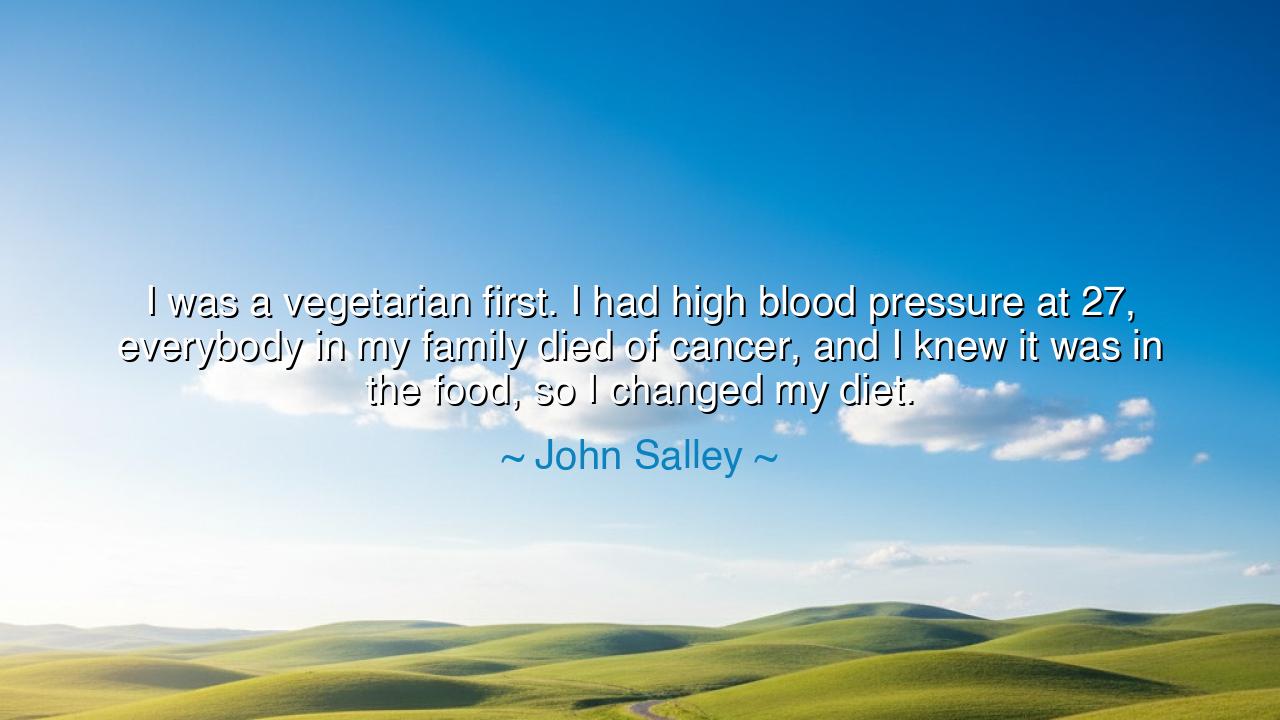
I was a vegetarian first. I had high blood pressure at 27
I was a vegetarian first. I had high blood pressure at 27, everybody in my family died of cancer, and I knew it was in the food, so I changed my diet.






In the words of John Salley, “I was a vegetarian first. I had high blood pressure at 27, everybody in my family died of cancer, and I knew it was in the food, so I changed my diet,” there resounds not just a story of personal change, but an awakening—a moment when a man looked upon the pattern of suffering and said, It shall end with me. These are not words of vanity or fear, but of revelation, born from pain and turned into purpose. In them we hear the ancient call of self-mastery: to know that the fate written by one’s ancestors need not be the fate of the self, if only one has the courage to change.
To “change one’s diet” is more than to alter what is eaten; it is to shift one’s way of being. The wise of old knew this truth well. For what we consume becomes the flesh of our flesh, the thought of our thought. In the temples of Hippocrates, healers whispered the sacred law: “Let food be thy medicine.” They knew that each meal is a choice between life and decay, between clarity and corruption. Thus, Salley’s insight—that disease lies in the food—is not new, but a return to the wisdom of the ancients, forgotten by the hurried hearts of the modern age.
When he says, “everybody in my family died of cancer,” his voice becomes that of countless souls through the centuries who have looked upon the graveyards of their lineage and wondered if destiny was a prison. But the brave do not accept fate as final; they rise against it with understanding. The ancient warriors of Sparta trained their bodies not for comfort, but for endurance; they knew that the body is both fortress and weapon. So too did Salley take up arms—not of steel, but of self-discipline—against the silent enemy within his blood. His transformation was not merely dietary; it was heroic, a rebellion against the chains of inheritance.
Consider the story of Asclepius, the healer of Greek myth, who learned the secrets of resurrection and healing from the serpent of wisdom. The gods, fearing his power, struck him down with lightning. Yet his legend endured, for he revealed the eternal truth: that healing is not given, but chosen. John Salley, like Asclepius, grasped that truth—not through myth, but through experience. When his own body cried out with high blood pressure at an age when others are still young, he listened—not to denial, but to wisdom. He turned inward, and in doing so, he turned his fate outward toward life.
There is sorrow in his tale, but also triumph. To lose family to sickness is to walk through the valley of despair, yet Salley did not linger there. He beheld the link between the body and the earth, between what man takes and what he becomes. By embracing vegetarianism, he chose to align himself with the gentler rhythms of creation—to partake of life without taking it. In this, there is both compassion and clarity: compassion for the living world, and clarity that true nourishment must heal, not harm.
The ancients would have called this balance—the harmony between flesh and spirit. For as the Stoic philosopher Epictetus taught, “No man is free who is not master of himself.” Salley’s mastery began with his plate, but it reached into his soul. By changing his diet, he changed his destiny. He broke the cycle of suffering by transforming awareness into action—a lesson that echoes like thunder through the generations.
Let this teaching be passed to all who hear it: the body is the garden of the spirit, and every meal a seed. Choose what you eat as you would choose your path in life—with care, reverence, and wisdom. Do not wait for sickness to teach you what balance already offers. Eat with mindfulness; move with purpose; live in harmony with the laws of nature, for they are the same laws that govern health and peace.
Thus, remember the lesson of John Salley—that change is not born from fear, but from understanding. When the body falters, listen; when the heart warns, obey. The blood of one’s ancestors may whisper of disease, but the choices of one’s spirit can sing of renewal. For the ancient truth endures: the one who governs what enters the body, governs what becomes of the soul.






AAdministratorAdministrator
Welcome, honored guests. Please leave a comment, we will respond soon